- April 5, 2022
- by Cindy Williams
- 0 Like
- 0 / 5
- Cuisine: Comfort Food
- Difficulty: Easy
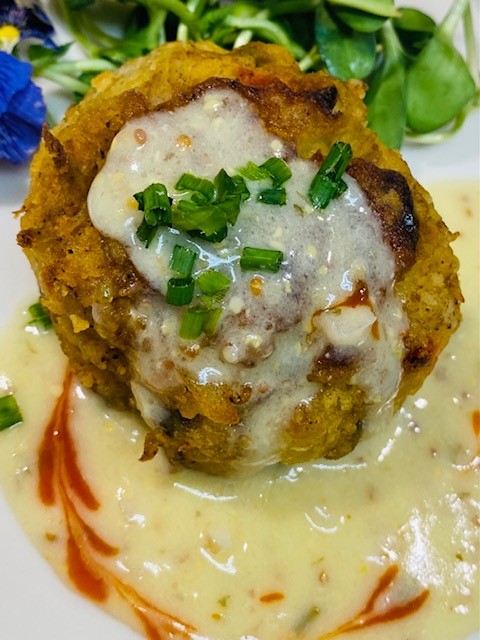

-
Prep Time2 hours including chilling time
-
Cook Time35 minutes
-
Serving6
-
View1,286
NOTE: I MADE THESE ON JANUARY 17, 2026 AND ADDED A TBSP. OF DIJON MUSTARD AND A SQUEEZE OF LEMON JUICE TO THE CRAB CAKE MIXTURE. ALSO, I NEEDED MORE PANKO BREAD CRUMBS THAN THIS RECIPE CALLS FOR, AND AFTER I FORMED THE PATTIES I PATTED THEM IN MORE CRUMBS. REFRIGERATING THE PATTIES FOR A FEW HOURS HELPED FIRM THEM UP PRIOR TO PAN FRYING IN BUTTER. AND AFTER THEY BROWNED IN THE PAN I PUT THEM IN THE OVEN AT 350 DEGREES UNTIL THEY WERE COOKED THROUGH. I SERVED THEM WITH A MAYO-REMOULADE SAUCE AND THEY WERE DELICIOUS!
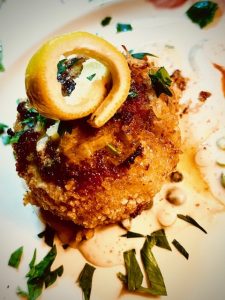

This recipe was inspired by the crab cakes with Meaux Mustard Beurre Blanc in “Julia Reed’s New Orleans: Food, Fun and Fieldtrips for Letting the Good Times Roll,” (2019). That’s a great cookbook because Reed presents classic recipes with something new… a twist, as it were. And that’s quite an accomplishment because how do you improve on recipes that require no improvement? Crab cakes, for example. Everyone (in New Orleans) knows that they’re all about the quality of the crab meat and the nature of the binder (egg, breadcrumbs, even a bechamel sauce if you want a really creamy cake). In Reed’s version of crab cakes, she uses pureed shrimp as a binder. While I appreciate that effort and it might be great, I thought that was gilding the lily. So, I made a more traditional crab cake and allowed myself to be inspired by her mustard Beurre blanc sauce (because I’m the Beurre blanc queen). The result was divine, and my dinner guest loved it. I had a light almost fluffy cake with a crispy buttery crust and a tangy mustardy-butter sauce that perfectly complimented but did not overwhelm the crabmeat. In my less than humble opinion, the plating was pretty too (see the middle picture, above). I highly recommend Julia Reed’s cookbook — the pictures are beautiful, and her writing is lively and intimate. Sadly, Julia Reed died in 2020 at age 59. She was someone I admired from afar, and slightly envied because it seemed she had figured out how to make a living out of being witty and smart and enjoying herself. The following is an excerpt from her obituary by John Meacham in Garden & Gun.
Born in Greenville, Mississippi, on September 11, 1960, Julia Evans Reed was the daughter of Judy and Clarke Reed. Her mother was a native of Nashville, the child of a prominent Belle Meade family; her father, a businessman and leader of the Mississippi Republican Party who played a role in the years of Richard Nixon, Gerald Ford, Ronald Reagan, George H.W. Bush, and George W. Bush.
As the novelist Jay McInerney recalled, “Julia Reed was Mississippi’s answer to Dorothy Parker, gifted with a biting wit, a fierce intellect, and a generous spirit of hospitality. She was an intellectual and a hedonist, a brilliant raconteur with a colorfully profane vocabulary who could whip up a delicious dinner for twenty of her friends and then drink them all under the table before waking up a few hours later to deliver a sparkling performance on MSNBC. She was unforgettable and irreplaceable.”
Educated in Greenville, and at Madeira, Georgetown, and American University, Julia lived and worked in Washington, D.C., New York City, New Orleans, and Greenville. A longtime editor and writer for Vogue magazine, she also contributed to the New York Times, Newsweek, Conde Nast Traveler, the Wall Street Journal, U.S. News & World Report, and Elle Décor. And until the time of her death, she was a cornerstone of Garden & Gun, where loyal readers and fans would turn immediately to her column for dispatches from her world.
As an author, columnist, and speaker, Reed was a figure in the tradition of M.F.K. Fisher and of Edith Wharton. She was a writer of great range whose subjects included corrupt but charming Southern politicians, first families, food, art, architecture, gardening, decorating, and the triumphs and the tragedies of the American South.
Her books included Julia Reed’s New Orleans: Food, Fun, and Field Trips for Letting the Good Times Roll (2019); South Toward Home: Adventures and Misadventures in My Native Land (2018); Julia Reed’s South: Spirited Entertaining and High-Style Fun All Year Long (2016); The House on First Street: My New Orleans Story (2008); Ham Biscuits, Hostess Gowns, and Other Southern Specialties: An Entertaining Life (2009); and The Queen of the Turtle Derby and Other Southern Phenomena (2005).
If we’d tried to invent a character like Julia, nobody would have believed it. She was a tsunami of talent, charm, and energy. She could write about anything and make it sing. Her distinctive voice was at once affectionate and arch—a tough combination to pull off.
She lived large. On any given day or season you might find Julia driving around Mississippi with Jessica Lange. Or dining at Doe’s Eat Place in Greenville with Anthony Bourdain. Or she’d be in Paris, reporting on caviar for the Wall Street Journal. Or in London, picking up a new “sleep coat” for her father. Or filing an essay for Vogue on a planned wedding that went awry some decades ago; a favorite detail was that her mother had so much champagne on hand that she was still giving the postman bottles of it three years later. Describing a New Year’s Eve party at the Georgetown house of Washington Post legend Ben Bradlee and his wife, the writer Sally Quinn, Julia recalled: “I walked in behind Alma and Colin Powell. So far, so good. Plenty of booze, and plenty of people drinking it. A delicious late supper of choucroute and mashed potatoes soaked it all up, and by midnight everybody was dancing. Lauren Bacall danced. Tom and Meredith Brokaw danced. We all danced, with the exception of Al Gore, who, at the stroke of midnight, was standing almost alone in the living room talking about the environment.”
I have always been struck by how many people come up to me to bear unsought witness to Julia’s power—the readers of her work who, on learning that I am fortunate enough to be her friend, want to tell me how important, how wonderful, how indispensable they find her voice. In her work and in friends we will always be able to hear her again—learning anew from her alternately funny and wise, charming and knowing, transporting and illuminating vision of life. Her voice lingers even now, resonating still.
Ingredients
CRAB CAKES
Mustard Beurre Blanc
Directions
Always pick over the crabmeat and be sure there are no shells! You wouldn't want to eat a piece of cake and bite into an egg shell and you don't want to find a shard of crab shell in a crab cake.
Saute the bell peppers, shallots, and garlic in a pan over medium heat, then cool.
In a large bowl, add the crabmeat, the sauteed and cooled vegetables, the mayonnaise, the breadcrumbs, the scallions and the well beaten egg. Combine with your hands and try not to break up the crabmeat too much.
Season the crab mixture with Tony Chachere's seasoning. You could add a splash of Worcestershire sauce as well. Salt to taste. Parsley optional.
Form the crab mixture into thick cakes. This recipe will make 6 to 8 cakes. Place them on a plate and refrigerate for an hour.
While the cakes are in the frig, make the Beurre Blanc Sauce. Put the shallots and vinegar and wine and tarragon in a saucepan and reduce until it is about 3 TBS of syrup. Whisk the cold butter in, one TBS at a time. You can add a splash of heavy cream near the end to thicken it up if you want to. Regulate the heat as you whisk in the butter. You want the butter to start melting immediately when you add it, but you don't want to overheat this sauce or it will separate. You want a thick creamy sauce, but it will not be as thick as a Bearnaise.
Stir in a TBS of coarse grain mustard. Set the sauce aside and keep warm. You can do this by pouring it in a pyrex measuring cup. Then rinse out your saucepan and put about 2 inches of water back in it. Set the measuring cup down in the pan and keep over very low heat. Watch this and don't let it get too hot or it will separate.
Heat your oven to 335 degrees.
When you are ready to fry the cakes, heat a few TBS or butter over medium high heat. DREDGE THE CAKES VERY LIGHTLY IN FLOUR. Then brown the cakes on both sides. You want a crispy golden crust.
Put the cakes on a sheet of parchment on a cookie tin and put them in the oven for about 25 or 30 minutes.
Plate by swirling some sauce on the plate, then place the crab cake on the sauce. Drizzle some sauce over the crab cake. A few dots of hot sauce make nice punctuation points! You can also sprinkle some chives over the top and finish the plate with some greens (arugula or sprouts would be good).
Conclusion
One crab cake was enough for a dinner entree for me, but this would also be a great brunch dish. And if you have left-over un-cooked crab cakes, you can hold them in the refrigerate for at least one more night. Crab cakes two nights in a row would be pretty great. (Maybe spoon some bottled tartar sauce over them the second night!)
You May Also Like
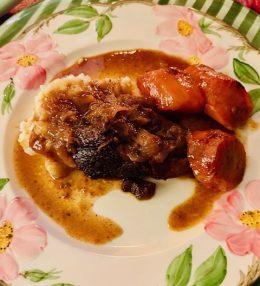







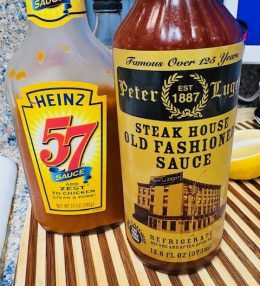

CRAB CAKES WITH MUSTARD BEURRE BLANC
Ingredients
CRAB CAKES
Mustard Beurre Blanc
Follow The Directions
Always pick over the crabmeat and be sure there are no shells! You wouldn't want to eat a piece of cake and bite into an egg shell and you don't want to find a shard of crab shell in a crab cake.











Saute the bell peppers, shallots, and garlic in a pan over medium heat, then cool.











In a large bowl, add the crabmeat, the sauteed and cooled vegetables, the mayonnaise, the breadcrumbs, the scallions and the well beaten egg. Combine with your hands and try not to break up the crabmeat too much.











Season the crab mixture with Tony Chachere's seasoning. You could add a splash of Worcestershire sauce as well. Salt to taste. Parsley optional.











Form the crab mixture into thick cakes. This recipe will make 6 to 8 cakes. Place them on a plate and refrigerate for an hour.











While the cakes are in the frig, make the Beurre Blanc Sauce. Put the shallots and vinegar and wine and tarragon in a saucepan and reduce until it is about 3 TBS of syrup. Whisk the cold butter in, one TBS at a time. You can add a splash of heavy cream near the end to thicken it up if you want to. Regulate the heat as you whisk in the butter. You want the butter to start melting immediately when you add it, but you don't want to overheat this sauce or it will separate. You want a thick creamy sauce, but it will not be as thick as a Bearnaise.











Stir in a TBS of coarse grain mustard. Set the sauce aside and keep warm. You can do this by pouring it in a pyrex measuring cup. Then rinse out your saucepan and put about 2 inches of water back in it. Set the measuring cup down in the pan and keep over very low heat. Watch this and don't let it get too hot or it will separate.











Heat your oven to 335 degrees.











When you are ready to fry the cakes, heat a few TBS or butter over medium high heat. DREDGE THE CAKES VERY LIGHTLY IN FLOUR. Then brown the cakes on both sides. You want a crispy golden crust.











Put the cakes on a sheet of parchment on a cookie tin and put them in the oven for about 25 or 30 minutes.











Plate by swirling some sauce on the plate, then place the crab cake on the sauce. Drizzle some sauce over the crab cake. A few dots of hot sauce make nice punctuation points! You can also sprinkle some chives over the top and finish the plate with some greens (arugula or sprouts would be good).



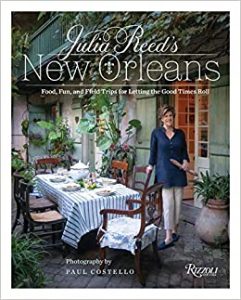

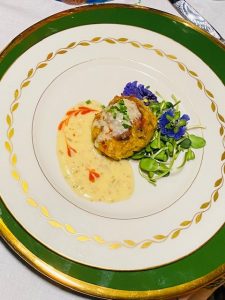
Leave a Review